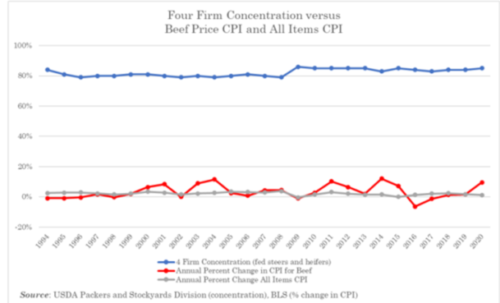Too big? The meat industry responds
I am on the mailing list for the North American Meat Institute (NAMI) the trade association for Big Beef, and I like knowing what it has to say.
Right now, it is in defensive mode. The industry must be—and ought to be—concerned about White House interest in making the beef industry more competitive.
But wait, says NAMI, there’s nothing new here. Four beef processors have held 80% of the market since 1994.
 And, it says, the meat industry is not responsible for the inflationary cost of meat.
And, it says, the meat industry is not responsible for the inflationary cost of meat.
It also denies anti-trust allegations.
In testimony to the House Judiciary Subcommittee on Antitrust, Commercial, and Administrative Law on “reviving competition,” NAMI said the meat industry is not to blame:
The administration will be surprised to learn that economic fundamentals have led to inflation. Labor shortages. Transportation and supply chain challenges. Regulatory policies. And all of those input challenges were coupled with record meat demand.
Collectively, these factors drove up prices for wholesale and retail beef…The discussion above demonstrates that free market fundamentals drive the cattle and beef markets and that what we have seen before and during the course of the pandemic was to be expected.
The testimony, which is well worth reading, makes this case. It does not discuss the behavior of the big four meat processors during the pandemic: forcing sick people to come to work, inducing the President to sign an executive order to keep plants open, squeezing ranchers so they can’t make a living, and demanding higher prices at the store.
NAMI may be right that consolidation in this industry happened a long time ago, but the pandemic revealed its exercise of power in a way that had not been previously so visible.
Let’s hope the Justice Department gets to work on this.

